HOW TO PAY FEES
Option 1 :
Applicable only for B.Tech. / M. Tech. / M.B.A Admission Year 2019-20 and above admitted - Students can pay the fees using the parents portal.
>> Refer the Guideline - How to Pay
Option 2 :
Applicable only for B.Tech. / M. Tech. / M.B.A Admission Year 2018-19 and before admitted - Students can pay the fees using online mode (MOBILE BANKING, INTERNET BANKING, RTGS, NEFT, GOOGLE PAY, PHONE PAY)
>> Click here for Bank details
Option 3 :
Applicable only for Diploma (All) Students can pay the fees using online mode (MOBILE BANKING, INTERNET BANKING, RTGS, NEFT, GOOGLE PAY, PHONE PAY)
>> Click here for Bank details
For any additional information contact @ Account Section Mobile number : 9960086496
Diploma Admission Bank Details for pay the fees using online mode.
BANK DETAILS
PAYMENT METHOD : MOBILE BANKING, INTERNET BANKING, RTGS, NEFT, GOOGLE PAY, PHONE
PAY
ACCOUNT DETAILS
BANK NAME : KALLAPPANNA AWADE ICHALKARANJI JANATA SAHKARI BANK LTD.
Account Name : THE Textile & Engg. Institute
BRANCH ADDRESS : GAONBHAG ICHALKARANJI
ACCOUNT NUMBER : 019002100000538
IFSC CODE : KAIJ0000019
TYPE : CURRENT ACCOUNT
_____________________________________________________________________________________
B. Tech. Degree Admission Bank Details for pay the fees using online mode.
BANK DETAILS
PAYMENT METHOD : MOBILE BANKING, INTERNET BANKING, RTGS, NEFT, GOOGLE PAY, PHONE
PAY
ACCOUNT DETAILS
BANK NAME : CENTRAL BANK OF INDIA
Account Name : DKTE’S Textile & Engg. Institute
BRANCH ADDRESS : ICHALKARANJI
ACCOUNT NUMBER : 1868044499
IFSC CODE : CBIN0282570
MIRC CODE : 416016201
TYPE : SAVING ACCOUNT
_____________________________________________________________________________________
MBA Admission Bank Details for pay the fees using online mode.
BANK DETAILS
PAYMENT METHOD : MOBILE BANKING, INTERNET BANKING, RTGS, NEFT, GOOGLE PAY, PHONE
PAY
ACCOUNT DETAILS
BANK NAME : KALLAPPANNA AWADE ICHALKARANJI JANATA SAHKARI BANK LTD.
Account Name : THE Textile & Engg. Institute
BRANCH ADDRESS : GAONBHAG ICHALKARANJI
ACCOUNT NUMBER : 019002100000536
IFSC CODE : KAIJ0000019
TYPE : CURRENT ACCOUNT
_____________________________________________________________________________________
M. TECH. Admission Bank Details for pay the fees using online mode.
BANK DETAILS
PAYMENT METHOD : MOBILE BANKING, INTERNET BANKING, RTGS, NEFT, GOOGLE PAY, PHONE
PAY
ACCOUNT DETAILS
BANK NAME : KALLAPPANNA AWADE ICHALKARANJI JANATA SAHKARI BANK LTD.
Account Name : D. K. T. E. S. TEXTILE & ENGINEERING INSTITUTE
BRANCH ADDRESS : GAONBHAG ICHALKARANJI
ACCOUNT NUMBER : 019002100000537
IFSC CODE : KAIJ0000019
TYPE : CURRENT ACCOUNT
Sports and the other physical activities are the integral part of the education institute and life. It offers vent to diffuse the excess energy and have balanced mind set. Sports activities provides opportunity to interact and make friends, strategize, learn to be the part of team and the most importantly inculcate the virtue of accepting the defeat with spirit and appreciate the winner.
Facilities
DKTE offers sports and fitness facilities to students and staff to stay active. Facilities for indoor and outdoor games are provided to students.
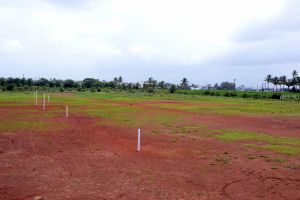

Play Ground Facility

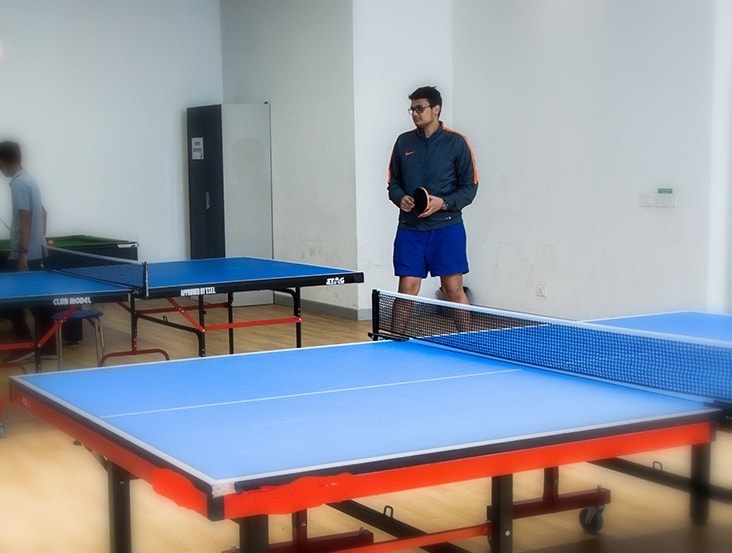
Indoor Facility


Gymnasium
Student Participation in Sports
Students are encouraged to participate institute/University/Zonal/State/National level sport events. Winners are awarded prizes, certificates and motivated with financial support. Students are consistently participating and achieving in sports like Chess, Badminton, Table Tennis, Swimming, Cricket, Kho-Kho, Kabaddi, Volley-ball, Football, Athletics etc.
Our Winners
 |
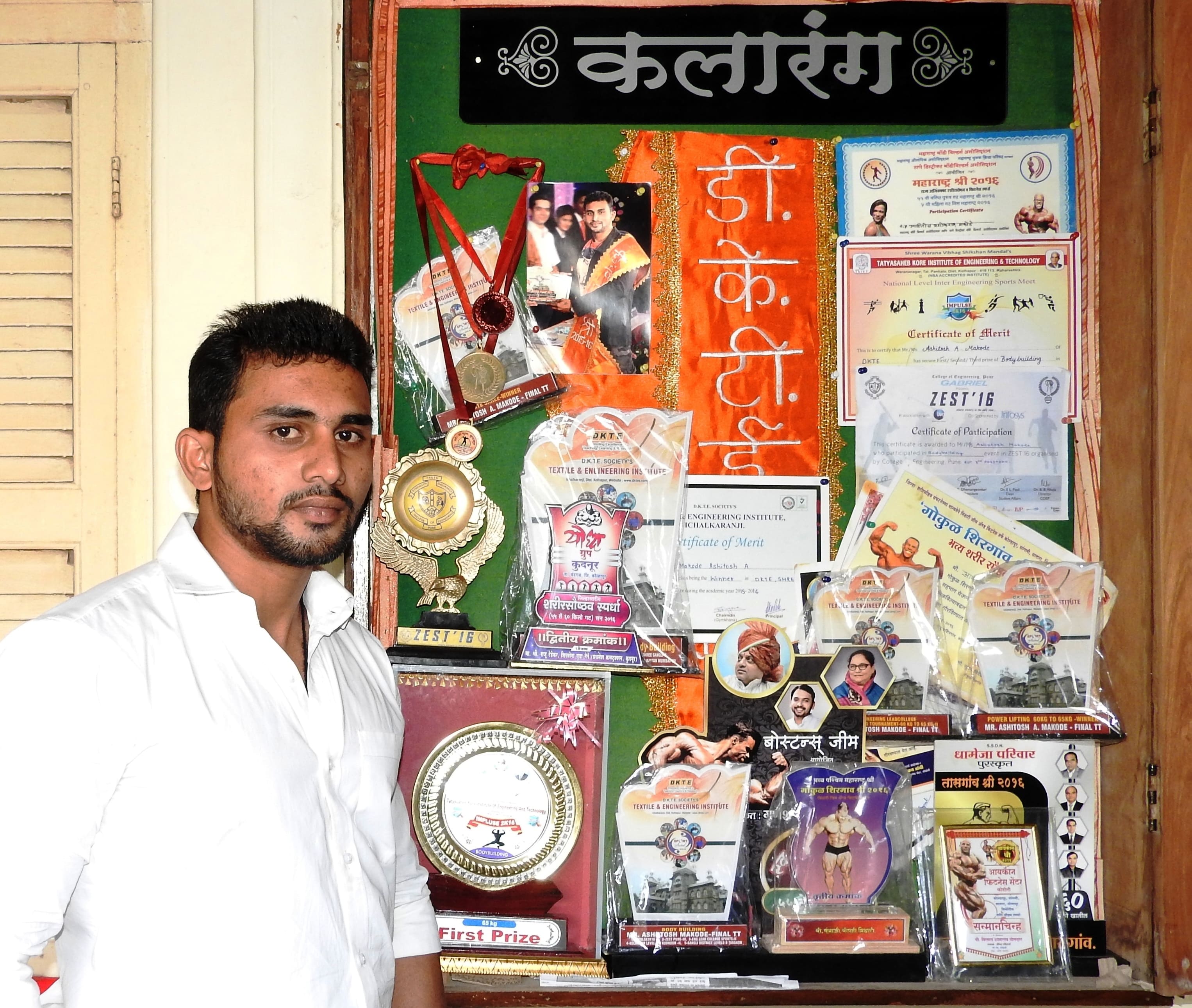 |
| Miss Ishwari Vardai (Yoga : Prizes in Rhythmic Yoga, Pair Artistic Yoga at National Yoga Competition) | Mr. Asutosh A. Makode (Body Building Prizes at National, State, Zonal & District Level) |
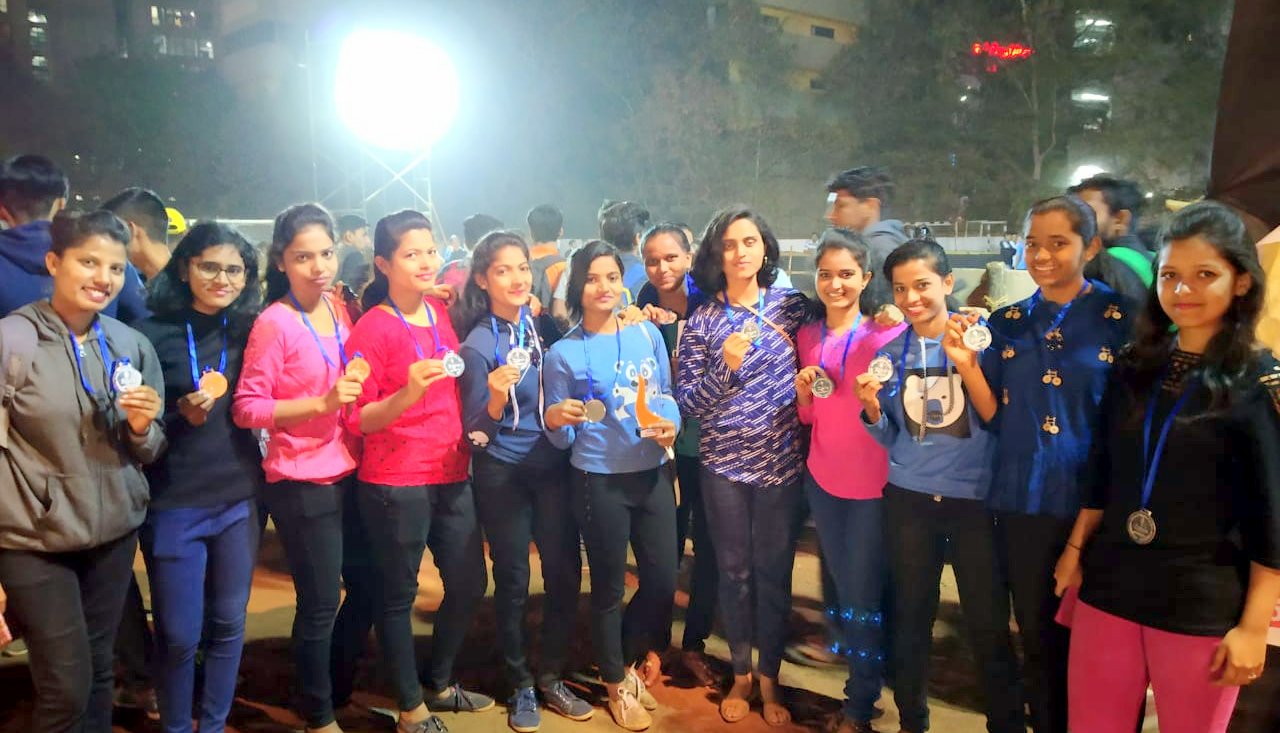 |
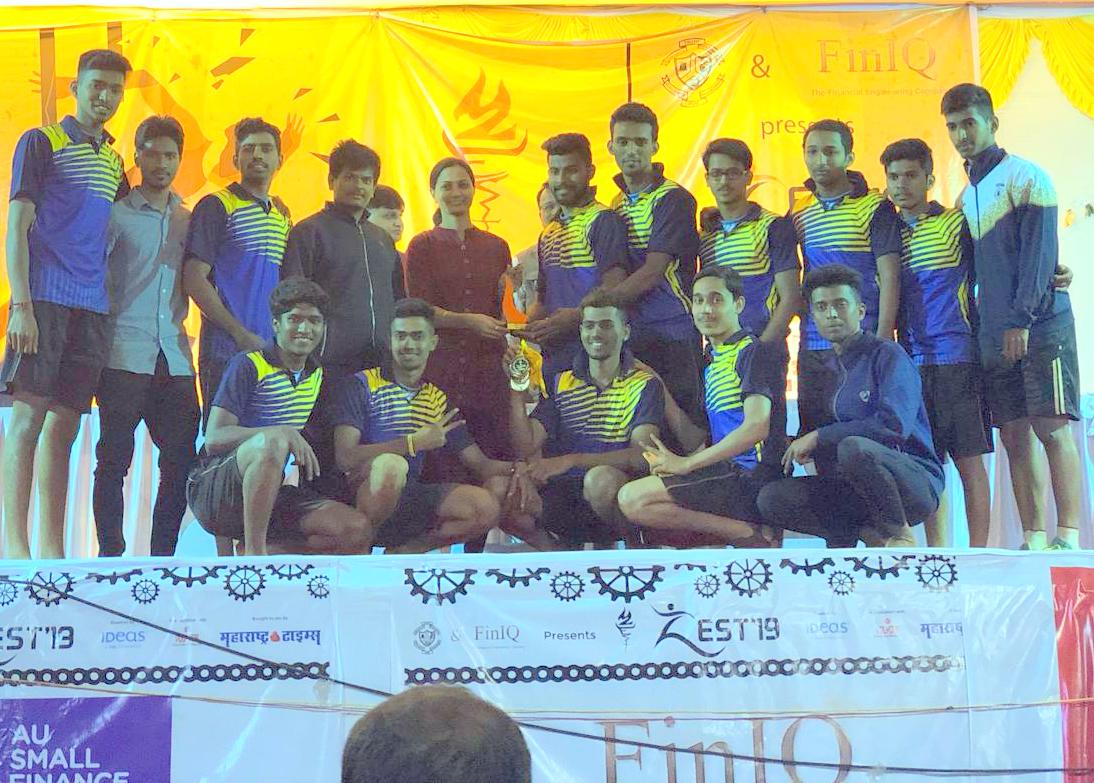 |
| Institute Girls Team (Kabbadi) Runner-up in ZEST 2K19 @COEP Pune | Institute Boys Team (Kho-Kho) winner team in ZEST 2K19 @COEP Pune |
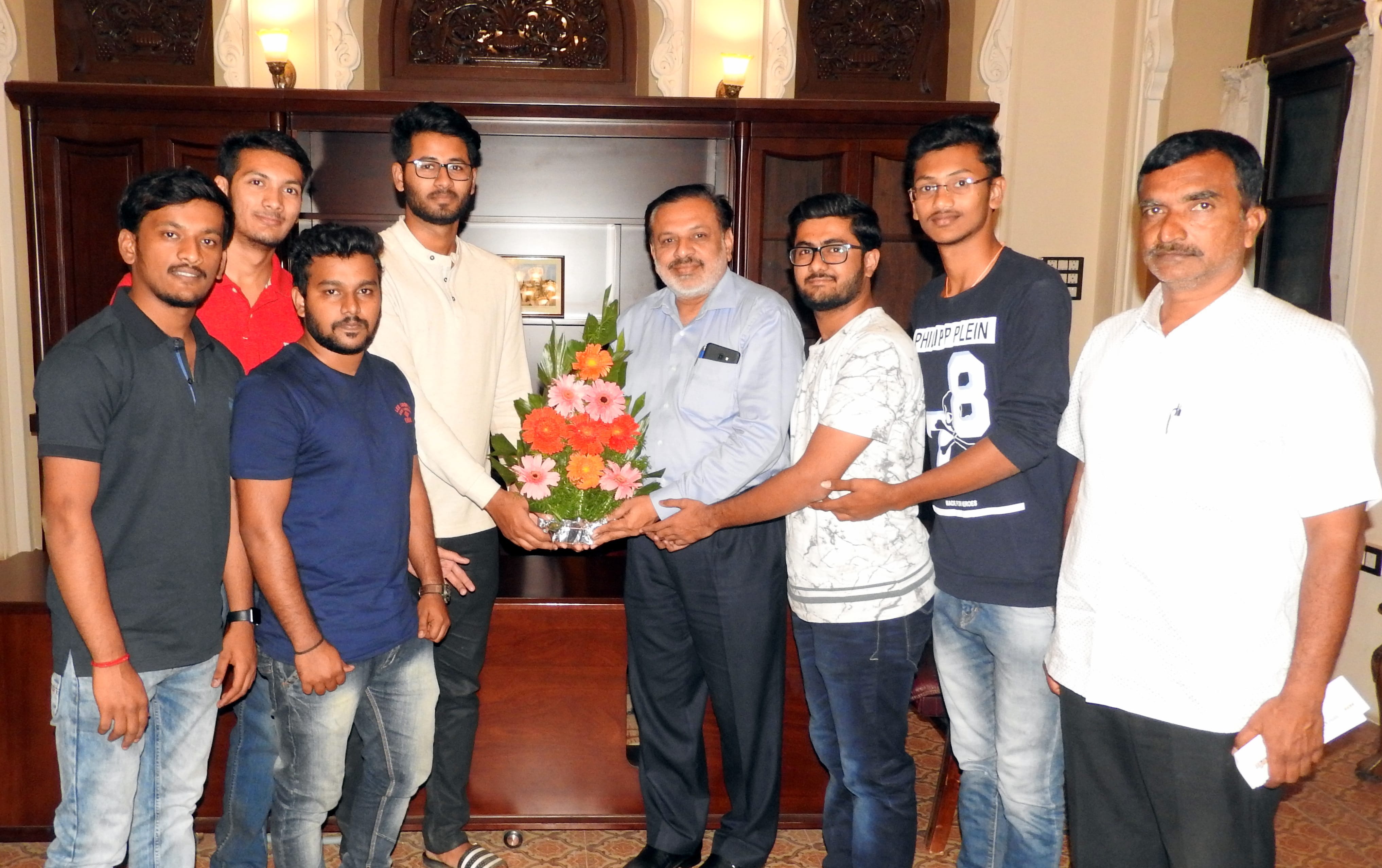 |
 |
| Felicitation of Inter Zonal, Zonal, lead College Winner Swimming team | Institute Boys Team (Kho-Kho) Winner at State Level |
More winners
| Sr. No. | Name | Award | Event | Venue |
|---|---|---|---|---|
| 01 | Joshirao Viraj Yogesh |
3rd 200M Back Stroke 3rd 50M Breast Stroke |
Inter Zonal Swimming Tournament | TKIET Warananagar |
| 02 | Chalke Manthan Sagar Joshirao Viraj Yogesh Ketkale Pranav Ajit Ketkale Tanmay Bharat |
Team Stood 3rd in 4x200M Free Style 3rd in 4x100M Free Style Relay |
Inter Zonal Swimming Tournament | TKIET Warananagar |
| 03 | Kabaddi - Women | Runner up | ZEST’20 | COEP Pune |
| 04 | Kho Kho - Men | Winner | ZEST’20 | COEP Pune |
| 05 | Joshirao Viraj Yogesh | 2nd 50M Breast Stroke | Inter Zonal Swimming Tournament | Kanya Mahavidyalaya, Ichalkaranji |
| 06 | Kumthale Abhinandan Ashok Joshirao Viraj Yogesh Ketkale Pranav Ajit Magdum Sammed Ashok Ganorkar Arpit Pradip |
Team Stood 2nd in 4x200M Free Style 2nd in 4x100 Medley Relay 1st in 4x100M Free Style Relay |
Inter Zonal Swimming Tournament | Kanya Mahavidyalaya, Ichalkaranji |
| 07 | Kabaddi - Women | Runner up | ZEST’19 | COEP Pune |
| 08 | Kho Kho - Men | Winner | ZEST’19 | COEP Pune |
| 09 | Om Ananda Mane |
Winner |
Boxing | Kolhapur Boxing Association at Pachgaon. |
| 10 | Tambe Yashwant Pandharinath Varute Ankush Satish Lokare Aniruddha Anil Naik Shaunak Shirish |
Runner up qualified for Inter zonal | Zonal Table Tennis Tournament | Dr. J. J. Magdum COE, Jaysingpur. |
| 11 | Chalke Manthan Sagar | 3rd in 50M Back Stroke 3rd in 400M Free Style |
Zonal Swimming Tournament | D. D. Shinde Sarkar College, Kolhapur |
| 12 | Joshirao Viraj Yogesh | 2nd 200M Back Stroke 3rd 50M Breast Stroke |
Zonal Swimming Tournament | D. D. Shinde Sarkar College, Kolhapur |
| 13 | Chalke Manthan Sagar Joshirao Viraj Yogesh Ketkale Pranav Ajit Ketkale Tanmay Bharat |
Team Stood 3rd in 4x200M Free Style 3rd in 4x100 Medley Relay 3rd in 4x100M Free Style Relay |
Zonal Swimming Tournament | D. D. Shinde Sarkar College, Kolhapur |
| 14 | Joshirao Viraj Yogesh | 2nd 50M Breast Stroke | Zonal Swimming Tournament | Kanya Mahavidyalaya, Ichalkaranji |
| 15 | Kumthale Abhinandan Ashok Joshirao Viraj Yogesh Ketkale Pranav Ajit Magdum Sammed Ashok Ganorkar Arpit Pradip |
Team Stood 2nd in 4x200M Free Style 2nd in 4x100 Medley Relay 2nd in 4x100M Free Style |
Relay Zonal Swimming Tournament | Kanya Mahavidyalaya, Ichalkaranji |
| 16 | Tambe Yashwant Pandharinath Varute Ankush Satish Lokare Aniruddha Anil Naik Shaunak Shirish |
Appreciation prize and qualified for Inter zonal | Zonal Table Tennis Tournament | Dr. J. J. Magdum College of Engineering, Jaysingpur |
| 17 | Chalke Manthan Sagar | 3rd in 50M Back Stroke 3rd in 50M Butterfly |
Zonal Swimming Tournament | Doodh Sakhar Mahavidyalaya, Bidri |
| 18 | Shah Yash | 3rd 50M BREAST STROKE 2nd 100M BREAST STROKE 2nd 200M BREAST STROKE |
Zonal Swimming Tournament | Doodh Sakhar Mahavidyalaya, Bidri |
| 19 | Joshirao Viraj Yogesh | 1st 100M Free Style 1st 50M Breast Stroke |
Zonal Swimming Tournament | Doodh Sakhar Mahavidyalaya, Bidri |
| 20 | Chavan Omkar | 1st 1M SPRING BOARD DIVING 1st 3M SPRING BOARD DIVING |
Zonal Swimming Tournament | Doodh Sakhar Mahavidyalaya, Bidri |
| 21 | Chalke Manthan Sagar Shah Yash Joshirao Viraj Yogesh Magdum Sammed Ketkale Pranav Chavan Omkar |
Team Stood 1st in 4x200M Free Style 1st in 4x100 Medley Relay 1st in 4x100M |
Free Style Relay Zonal Swimming Tournament | Doodh Sakhar Mahavidyalaya, Bidri |
| 22 | Takwade Manoj Mukund Tambe Yashwant Pandharinath Varute Ankush Satish |
Men Team Stood 3rd | Zonal Table Tennis Tournament | G K G Ghodawat Kanya Mahavidyalaya, Jaysingpur |
| 23 | Patil Samiksha Jayraj Gudase Smita Rajendra Zarkar Nikita Rajendra |
Women Team Stood 3rd | Zonal Table Tennis Tournament | G K G Ghodawat Kanya Mahavidyalaya, Jaysingpur |
| 24 | Harshada Dilip Kamble | Winner | Tangsoodo Martial Arts | Sangli |
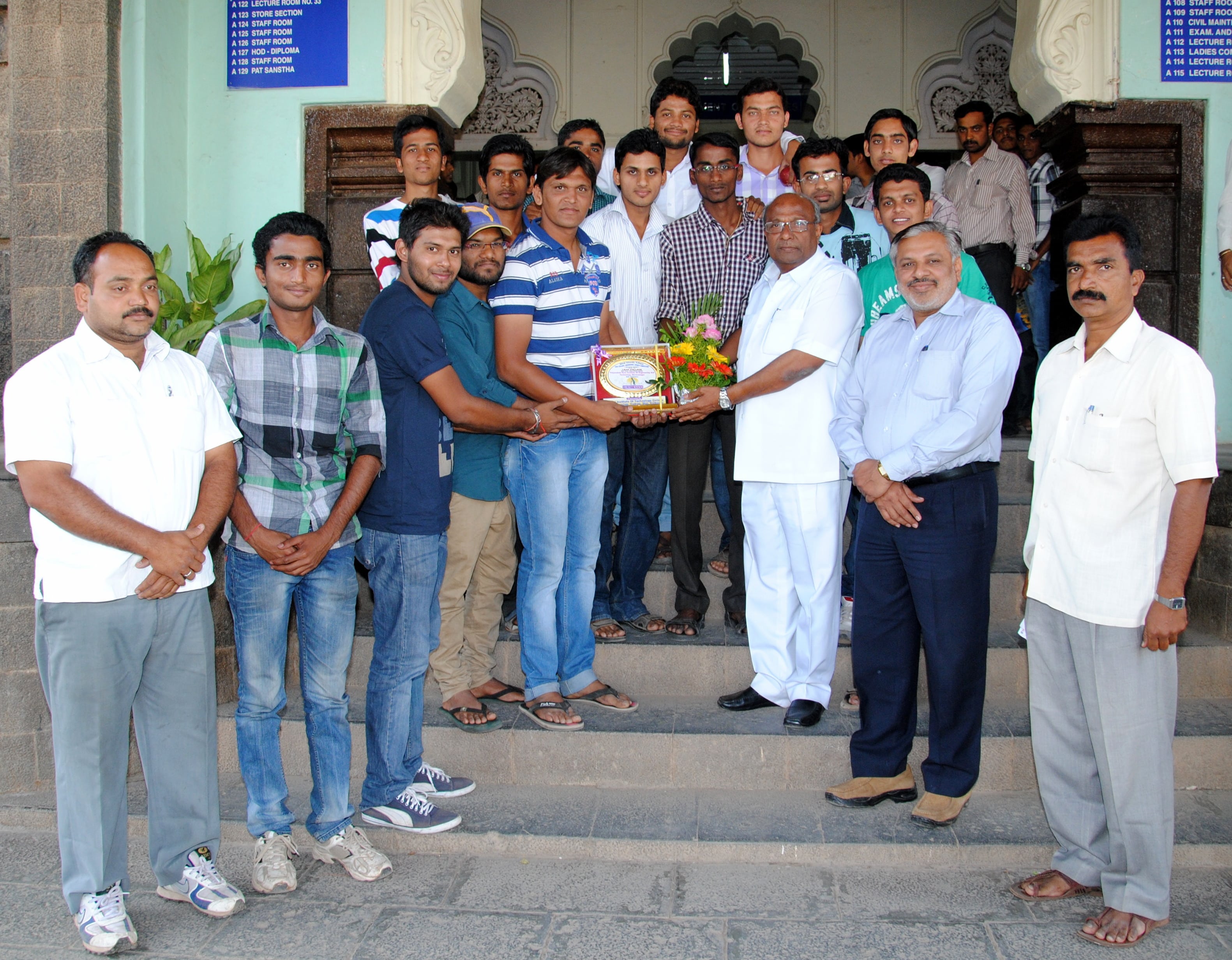 |
 |
| Felicitation of Inter Engineering Lead College Cricket Tournament Winner Team | Girls and Boys Kho-Kho Team Winners at Lead College Level |
More winners
| Sr. No. | Name | Award | Event | Venue |
|---|---|---|---|---|
| 01 | Badminton |
Men Winner | Lead College Tournament | DYP COE Kasaba Bavada, Kolhapur |
| 02 | Kabaddi | Women Winner | Lead College Tournament | DYP COE Salokhenagar |
| 03 | Table Tennis | Men Winner | Lead College Tournament | DYP COE Salokhenagar |
| 04 | Badminton | Men Winner | Lead College Tournament | KIT’s COE, Kolhapur |
| 05 | Badminton | Women Runner up | Lead College Tournament | KIT’s COE, Kolhapur |
| 06 | Kho Kho | Men Winner | Lead College Tournament | DKTES TEI Ichalkranji |
| 07 | Kho Kho | Women Runner up | Lead College Tournament | DKTES TEI Ichalkranji |
| 08 | Kabaddi | Women Winner | Lead College Tournament | DYP COE Salokhenagar |
| 09 | Volley ball | Men Winner | Lead College Tournament | KIT’s COE, Kolhapur |
| 10 | Cricket | Men Runner up | Lead College Tournament | KIT’s COE, Kolhapur |
| 11 | Badminton | Men Winner | Lead College Tournament | KIT COE Kolhapur |
| 12 | Kho Kho | Women Winner | Lead College Tournament | DKTES TEI Ichalkaranji |
| 13 | Kho Kho | Men Winner | Lead College Tournament | DKTES TEI Ichalkaranji |
| 14 | Table Tennis | Men Runner up | Lead College Tournament | Bharati Vidyapeetha's COE, Salokhe Nagar |
| 15 | Chalke Manthan Sagar |
1st in 50M Back Stroke |
Lead College Swimming Tournament | KIT COE Kolhapur |
| 16 | Chavan Omkar | 1st in 50M Butterfly 2nd in 100M Freestyle |
Lead College Swimming Tournament | KIT COE Kolhapur |
| 17 | Joshirao Viraj Yogesh | 1st 100M Free Style 1st 50M Breast Stroke |
Lead College Swimming Tournament | KIT COE Kolhapur |
| 18 | Shah Yash Chandrashekhar | 1st in 100M Free Style 2nd in 50M Breast Stroke |
Lead College Swimming Tournament | KIT COE Kolhapur |
| 19 | Magdum Sammed Ashok | 3rd in 50M Free style | Lead College Swimming Tournament | KIT COE Kolhapur |
| 20 | Chalke Manthan Sagar Shah Yash Joshirao Viraj Yogesh Magdum Sammed Ketkale Pranav Chavan Omkar |
Team Stood 1st in 4 X 50 M Medley Relay |
Lead College Swimming Tournament | KIT COE Kolhapur |
Players Played in University Team
| Sr. No. | Name | Award |
|---|---|---|
| 01 | Mr Sachin Suryakant Powar | Yoga |
| 02 | Miss Vardai Ishwari Prakash | Yoga |
| 03 | Mr. Bedagkar Siddhivinayak Sudhir | Yoga |
| 04 | Miss Patil Bhagyashri Bajirao | Kho-Kho |
| 05 | Miss Sapkal Sheetal Surendra | Fencing |
| 06 | Mr Chalke Manthan Sagar | Swimming |
| 07 | Mr. Kurhekar Pratik Sunil | Archery |
| 08 | Miss Patil Samiksha Jayraj | Table Tennis |
| 09 | Mr. Joshirao Viraj Yogesh | Swimming |
| 10 | Mr. Shah Yash Chandrashekhar | Swimming |
| 11 | Mr Akshay Vijay Sabrad | Swimming |
| 12 | Mr. Chavan Omkar | Swimming |
| 13 | Mr. Kitture Guruprasad Dattatraya | Kho Kho |
Competitions Organized
Our institute has also taken lead in organizing sports competition at Inter-zonal, Zonal and lead college level in sports like Kho-Kho, Kabaddi, Swimming and Indoor games etc. After the completion of Zonal, Inter-zonal & Inter Engineering events. Every year Institute’s “Annual Sports Meet” is organized, in that large number of events were conducted for both men & women.
Indoor Games
Chess, Carom, Badminton, Table-tennis etc.
Outdoor Games
Cricket, Kabaddi, Kho-Kho, Football, Volleyball, Ladies Cricket, Basketball etc.
Athletics
Running, Short-Put Javelin Through, Relays, Weightlifting, Bodybuilding, Swimming etc.


Engineering College Lead Kho-Kho Turnament arranged at DKTE
Annual Sports Day Celebration
Every year college organizes annual sports day for falicitating students for thier remarkable achievents in sports. This event motivates students to actively participate and win prices at National, State, Inter Zonal, Zonal and Lead College Level sports.


DKTE Shree Individual Prices
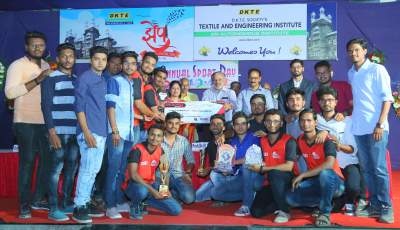
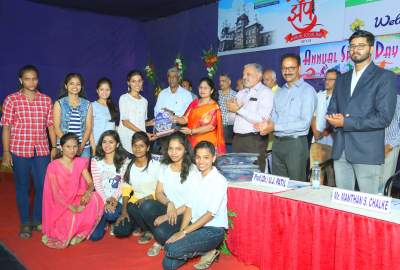
Boys Winner Team Girls Winner Team
Support System
Institute has provided strong support in following areas
1. Mentoring system to help at individual level
To improve Personal interaction between students and faculty so that faculty is becoming more responsive towards students and help them to improve their academic performance like class attendance, test results and participation in co-curricular activities, paper presentations, technical competition, participation in social activities are increasing. The mentor process is as followes
A) Mentoring Process:
i.) Department shall designate a mentor activity coordinator. At the start of each academic year the coordinator shall allot a batch of students to a mentor. (Batch size should be between 15-20 students)
ii.) The mentor shall conduct the meeting of the students once in every two weeks. Sample list of points to be discussed in the meeting are: - Academic issues, Infrastructure issues, Co-curricular and Extracurricular activities, Professional guidance.
iii.) Each mentor shall send a monthly report to the coordinator. The coordinator shall forward a summary to Head of the department for necessary actions on unresolved issues.
iv.) At the end of each semester, the coordinator shall prepare a summary of the mentoring activity along with feedback on the action taken
B) Mentoring Activity :
i.) Professional Guidance: - Professional guidance is provided by arranging lectures of eminent personalities from Academic, Industry & Social spheres.
ii.) Course work Specific: - Guidance is provided in order to improve the academic qualities, their results, Test results, Theory attendance, Industrial
iii.) Career advancement: - The students are motivated to prepare for campus recruitment drives, competitive Exams, foreign language learning, solving technical aptitude as per industry requirement, soft kills etc.
iv.) Total Development: - As stated above, the institute puts forward efforts to realize total development of the student. In addition to academics, literary, cultural and sports activities are conducted which offer avenues for leadership qualities, decision making abilities, team spirit, precision, analytical capabilities, socio-psychological awareness etc. which make an individual an intellectually mature human being.
2.Feedback analysis and reward/corrective measures taken
The institute has a well-established feedback collection process and corrective/ preventive actions
Types of Feedback:
1. Course Specific
2. Faculty Specific
3. Institutational Facilities
1. Parents Feedback
2. Alumni Feedback
3. Peer Feedback
4. Employer Feedback
Process of Feedback:
i.) The institute has a standard questionnaire for taking the student feedback about facilities.
ii.) The feedback is taken once/twice in a academic year.
iii.) Appropriate corrective/ preventive actions are initiated at the department or institute level, whenever necessary.
3. Self Learning
The institute is promoting self-learning capabilities among students by organizing project contests, robotics events, seminars on latest technologies. Personal counseling is done at department level for interdisciplinary projects.
A) Following are various modes of self-learning & facilities created by the institute to fulfill students need:
•Learning with Multimedia Techniques
•NPTEL Resource Centre and Study Center
•MOOCs (Massive Open On-line Courses) from Indian Institute of Technology, Bombay.
•Industry Webinars
•National Mission on Education through Information Communication Technology (NMEICT) project of MHRD, Govt of India.
•Spoken Tutorial Project of IIT Bombay
•e-Yantra Robotics Nodal Center of IIT Bombay
4. Career Guidance
The Career Guidance Cell is established on 16th Sept 1998. The purpose of Career Guidance Cell is to give latest information and guidance to students about the opportunities available in India and abroad after graduation. So that students can plan early and take the right decisions according to their capacities, skill and interest. Every year good number of students passing exams like GRE, TOFEL, GATE etc. and joining to the reputed higher education Institutes in India and Abroad.
Objectives of the Career Guidance Cell
•To motivate students for Higher Education in India and Abroad by personal counseling and by conducting seminars and workshops.
•To provide information about Scholarships, Research Scholarships, Teaching Assistantships, Part-time jobs etc.
•To offer guidance about Competitive examinations such as GRE, TOFEL, GMAT, IELTS, GATE, CAT AND CET.
•To provide guidance about Universities, Programmes, Cost of study, Cost of living, Passport and Visa.
•To Create awareness about importance of Foreign Languages like German, Japanese, French etc. and to conduct Foreign Language courses.
5. Entrepreneurship Cell
Institute has established "Entrepreneurship Development Cell" (EDC), which has been sponsored by Department of Science & Technology Govt. of India, New Delhi, and All India Council for Technical Education, New Delhi.
Entrepreneurship Development Cell" (EDC) was established aiming to support technocrats and entrepreneurs. EDC is acting as a tool to promote entrepreneurship and self-employment amongst technical students as an attractive and viable career option. Also aims to develop the skills required for being an Entrepreneur.
Objectives of EDC:
•To provide a platform to become an 'Entrepreneur'.
•To act as an institutional mechanism for providing various services including information to budding S & T entrepreneurs.
•To create Entrepreneurial culture in the parent institution and other.
•To catalyze and promote development of S & T based enterprises and promote employment opportunities.
•To create technology awareness and promote technology based enterprises in existing Small & Medium Enterprises (SMEs) of the region.
•To respond effectively to the emerging challenges and opportunities both at national and international level relating to SMEs and micro enterprises.
Institute has established Entrepreneurship Development Cell" (EDC), which has been sponsored by Department of Science & Technology Govt. of India, New Delhi in 2004.
AICTE New Delhi has given recognition for the best practices
Followings best practices are followed in the institute:
1. Dynamic curricula structure strictly in adherence with AICTE guidelines. Regular and Major Curricula content revisions with due help of an expert academicians, industrial personnel and internationally renowned pedagogical experts. Global and local technological trends and impacts are studied prior to such revisions with keeping the program educational objectives in mind.
2. Most of the syllabus focusses on higher level thinking like analyzing, evaluating and creating than just understanding and explaining the concepts.
3. Choice based credit system with Honors and Minor certification Schemes (with additional credits) introduced for aspiring learners.
4. In every semester, academic audit is conducted by Internal and External expert for maintaining quality of outcome based education.
1. Kranti Garment Training Centre : DKTE along with the Ichalkaranji Municipal Council started a Garment Training Centre to provide training facilities the women from poor class in the garment manufacturing, free of cost. As a result of the availability of trained personals, garment industry started to grow in Ichalkaranji and today over 6000 stitching machines have been installed. The DKTE is thus doing a commendable job in the area of women empowerment.
2. Training and Rehabilitation of Devadasis
3. Carpet manufacturing training for Destitute Women
DKTE is playing a vital role for addressing the burning environmental issues with following projects related to the environment.
1. Preparation of Environmental Status Report, Plan and Action : To address the environmental issues in Ichalkaranji, prepared six Environmental Status Reports which highlights on the quality of air, water, soil, noise etc. Further, the environmental management plan given acts, which are useful tool to combat pollution. Also introduced the concept of recycling of wastewater in the industry. This has tremendously reduced the pollution load.
2. Effluent Treatment Plants : Designed & Developed six Effluent Treatment Plants & three common effluent treatment plants for treating Textile Process effluents.
3. Installation of Solar Light System in Rural Area
Other supports are listed below:
1. Organization of Blood Donation Camp: A Blood Donation camp is organized twice in a year, as a social responsibility, around 500 bottles of blood is donated through the society.
2. Social Activities through National Social Service (NSS) Scheme.
3. Organization of Gram Swachata Abhiyan and Village Development programme
4. Providing Medical Equipment to needy patients on nominal charges
5. Helping to orphanage and old people hostels at Chokak Ashram, Solapur Ashram, and Velankar Ashram Sangali
Page 23 of 40